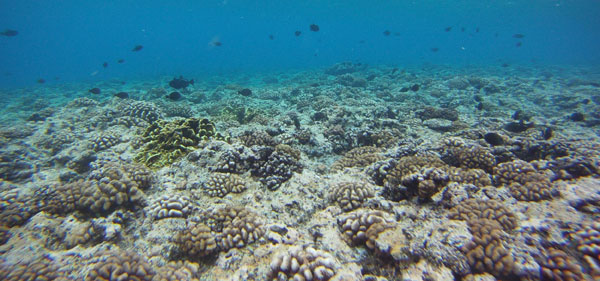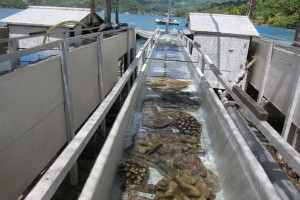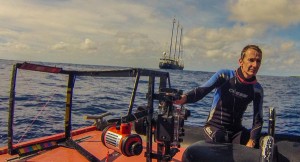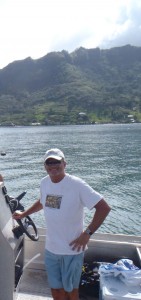CSUN Marine Biologists Receive Nearly $1.9 Million for Coral Reef Research

The coral reefs of French Polynesia near Tahiti. Photo courtesy of Robert Carpenter.
The National Science Foundation (NSF) has awarded California State University, Northridge marine biologists Robert Carpenter and Peter Edmunds nearly $1.9 million to further their study of the effects ocean acidification on coral reefs.

CSUN’s research site in French Polynesia. Photo courtesy of Robert Carpenter
For more than a decade, the pair have taken CSUN graduate and undergraduate students with them to the coral reefs of French Polynesia near Tahiti as they conduct research on how climate change — in particular the increasing acidification of the world’s oceans, affect the reef ecosystem — and the broader implications for the world’s oceans.
The NSF grant for $1,892,911 will allow Carpenter and Edmunds to take their project to the next level. For the first time, a yearlong experiment will use replicated outdoor water flumes with different carbon dioxide treatments. Additionally, these experiments will be extended to the field to quantify the effects of reduced pH — the lower the pH level, the more acidic the water is — on fully intact reef systems off Moorea, located west of Tahiti in the Windward group of French Polynesia’s Society Islands. The marine biologists hope to assess ways through which organisms might mitigate some of the negative effects of increasing acidification.
“One of the key things we want to be able to do is to better understand what the reef will look like in 50 years’, 100 years’ time,” Edmunds said. “The more negative of our colleagues say that reefs will dissolve and disappear. We’ve felt for a long time that that’s not a true reflection of the full range of possibilities. We hope to gain insight into the possibility that in 50 years’ or 100 years’ time, there will be a subset of corals that are still surviving. While these may for attractive marine communities, they likely will provide very different goods and services than they do today.”

Peter Edmunds
Among the oldest and most diverse of the earth’s ecosystems, coral reefs provide natural storm barriers for homes and beaches; habitat for more species per unit than any of the planet’s marine environments; commercial fisheries; tourism; and recreation jobs. Often called the “medicine cabinets of the 21st century,” the reefs’ plants and animals are important sources of new medicine.
They are also “the canary in the coal mine,” warning of the dangers ahead as the oceans’ continued acidification threatens the status of current marine ecosystems, Carpenter said.
Carpenter and Edmunds are focusing their research on how the algae and corals in a reef system respond to increase the probability of surviving in a warmer and more acidic ocean. To do that, the pair will conduct some of their experiments underwater on the reef itself.
“What we’ve been able to do is step up from our initial experiments, which involved taking individual specimens, bringing them in to the lab, creating the environmental conditions that we wanted to simulate and looking at the response at the organismal level,” Carpenter said. “So, the next step is to build flumes — basically long water tables where we can control the flow — and then build communities. Now, we’re expanding the ecological scale of the investigation by building communities with several organisms and several species, quantifying their response.

Robert Carpenter
“Finally, we want to expand the approach and go into the field and put similar flumes on intact reef communities and expose them to similar acidification treatments.”
Carpenter said that for years, researchers have focused on how individual species and organisms have responded to the oceans’ changes in laboratory settings. However, circumstances change when the organisms are brought together and other components of the reef community are introduced, he said.
“Until we can truly demonstrate what is going on in the field, there is going to be skepticism that what we’re seeing as a response is the true response,” he said.
Edmunds said the NSF grant underscores the global impact their research can have.
“These issues are immensely important for any country that has a coastline,” he said. “It has huge implications for local economies and tourism.”
Carpenter pointed out that officials estimate that the businesses that sprout up around coral reefs generate about billions of dollars in income annually.
The costs of climate change can be even more personal, Edmunds said.
“When you live on an island and your island is only three feet above sea level and climate change is pushing the sea level up and stopping coral reefs from laying down lime stones, it’s a pretty significant issue,” he said. “It can wash away your island and that’s it, end of country.”
Part of the NSF grant provides Edmunds and Carpenter an opportunity to include local K-12 educators in their research.
“You take those teachers out in the field and get them involved in the process, the passion is ignited in them — and that translates into the classroom and with their students,” Edmunds said. “They realize that science can be exciting and fun, and have an impact.”

 experience
experience